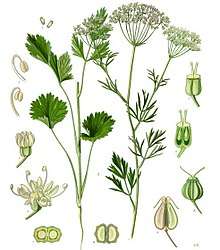anise
English
Etymology
From Middle English anys, borrowed from Old French anis, from Latin anīsum, from Ancient Greek ἄνισον (ánison), from Egyptian jnst.
Noun
anise (countable and uncountable, plural anises)
- An umbelliferous plant (Pimpinella anisum) growing naturally in Egypt, and cultivated in Spain, Malta, etc., for its carminative and aromatic seeds, which are used as a spice. It has a licorice scent.
- (US) Fennel
Usage notes
- Although fennel is widely referred to as anise (even in books and articles), such usage is considered incorrect by many.
Derived terms
terms derived from anise
- anise hyssop
- anise seed
- aniseed
- anisette
Translations
plant
|
|
fennel — see fennel
See also
References
- Oxford English Dictionary, 1st ed. "anise, n." Oxford University Press (Oxford), 1884.
French
Verb
anise
- inflection of aniser:
- first- and third-person singular present indicative and subjunctive
- second-person singular imperative
Spanish
Verb
anise
This article is issued from
Wiktionary.
The text is licensed under Creative
Commons - Attribution - Sharealike.
Additional terms may apply for the media files.
